Samaaro + Your CRM: Zero Integration Fee for Annual Sign-Ups Until 30 June, 2025
- 00Days
- 00Hrs
- 00Min
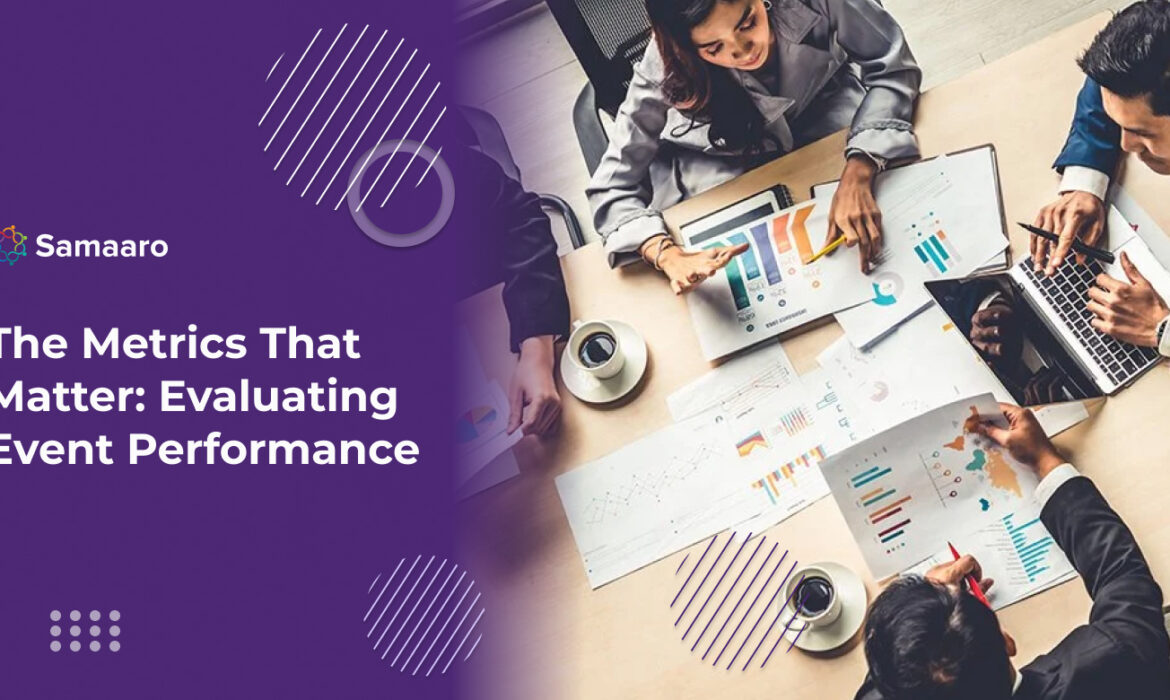
When the event is over, the dust has settled, and it is time to do the real work of evaluating how the event went. Was it a success in the eyes of the attendee? Did we generate valuable leads? Was what we received worth the investment? The answers are all in the metrics. When it comes to measuring the success of an event, it’s not just measuring the metrics. Rather, measuring events is about finding meaningful insights that will guide your future strategy.
Here is your useful guide to measuring the metrics that matter, how to measure the metrics, and what to do with the metrics to achieve better outcomes in event marketing.
Why Measuring Event Success Matters
Measuring your event metrics is much more than just proving the ROI of events, it helps you:
– Understand what worked: Identify positive aspects of your event so you can duplicate them for later events.
– Identify challenges: Find opportunities for growth to mitigate challenges for future events.
– Make data-driven decisions: Develop future strategy with real data and not based on assumptions or guesses.
– Prove value: Provide evidence of events value to stakeholders and substantiate for your event investment.
Key Metrics to Measure Event Performance
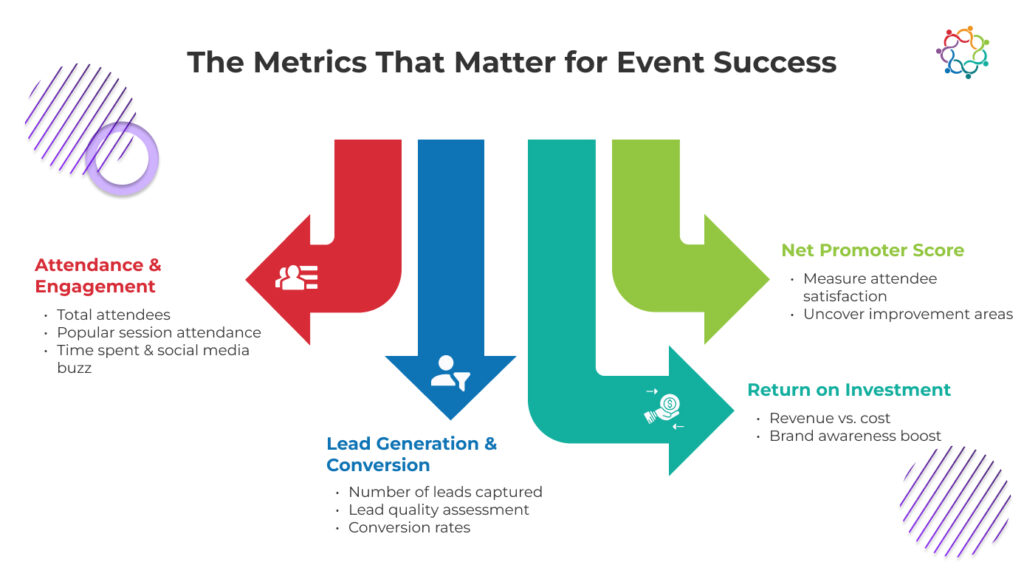
1. Attendance and Engagement Engagement metrics measures how well your event landed with attendees:
Total Attendee: A metric that demonstrates the reach of your event. If you have a goal of 300 attendees, compare the number of attendees to your previous event’s and strive for number indicates your events success.
Session Attendees: Tracking which sessions had the most attendees with indicate a preference in topics or speakers that had put on engaging talks or topics.
Time Spent: The longer attendees stay at your event, the more value they perceived of your offering. Use this as an indication of success.
Social Media Engagement: Track mentions, shares, hashtags and likes in social media channels. Strong engagement demonstrates that attendees were interested in being a part of the event and share their experience.
2. Lead Generation and Conversion
For many events, leads are the end goal at the end of the process. Use these measures to understand lead quality and conversion rates.
Leads generated: Count how many leads you captured at the event. This includes booth traffic, badge scans or information filled out during the event.
Lead quality: Not all leads are created equal. Segment leads by job role, size of company, purchasing authority or other factors that lets you focus on leads that are worth pursuing.
Conversion rate: This measure is the percentage of leads that engaged further down the sales funnel, meeting scheduled, demo completed, sale identified, etc.
3. Return on Investment (ROI)
ROI as a measure is one of the most important for proving value in your event.
Calculate ROI: Take total revenue generated and subtract total cost of the event, then divide by total event cost. Multiply by 100 to get the percentage.
Intangible returns: ROI is not just financial. Consider one value-add is brand awareness increased and/or strengthened customer relationships or increased employee team morale.
4. Net Promoter Score (NPS)
NPS is a popular measure of customer satisfaction and loyalty.
Measure satisfaction: Ask attendees ‘How likely to you recommend this event to someone else on a scale of 0-10?’
Analyzing Feedback: Assess the reasons for the scores to understand what thrilled participants as well as what could have improved.
Tools for Collecting and Analyzing Event Data
To track these metrics effectively, you’ll need the right tools.
1. Event Management Software
Event Marketing platforms, like Samaaro, provide an easy way to track attendance, session participation and lead generation real-time.
2. Analytics Tools
Google Analytics: Track website traffic and conversions related to your event.
Social Media Analytics: Measure social media reach and engagement using platform-specific insights or tools like Hootsuite.
Survey Tools: Use tools like SurveyMonkey to collect post-event feedback and calculate NPS.
3. CRM Software
Customer Relationship Management (CRM) software helps to manage leads and track your leads. CRMs that are compatible with your event management software have an integrated flow of data for follow up and reporting.
Best Practices for Measuring Event Success
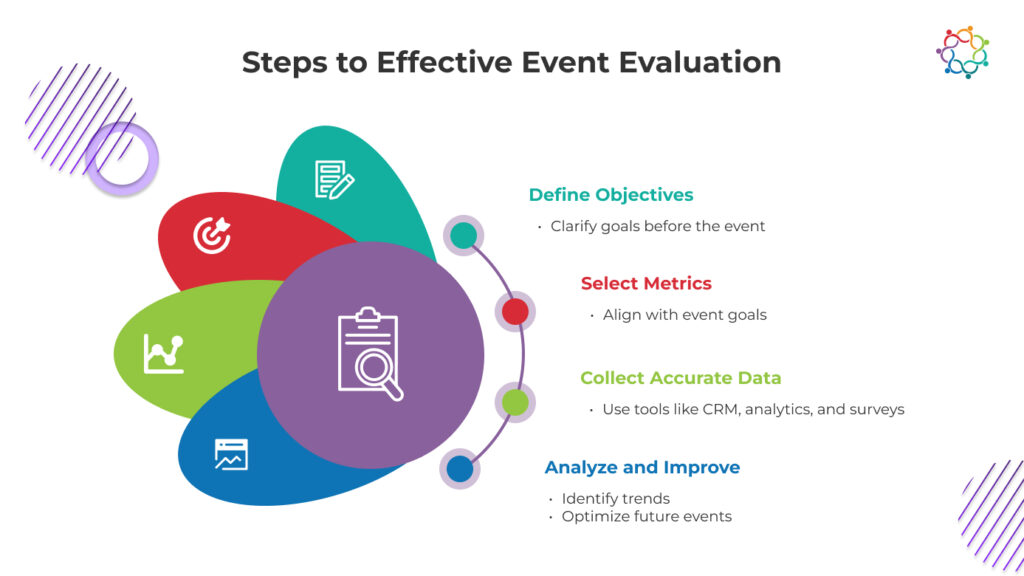
1. Set Clear Objectives
Prior to your event, you should set clear and specific goals such as the following:
– Increase attendance by 20%, from the previous year.
– Generate 200 qualified leads.
– Achieve a Net Promoter Score (NPS) of 80% or above.
2. Choose the Right Metrics
Always evaluate the metrics in relation to your goals. If lead generation is your main priority, then you will want to track metrics such as lead volumes, quality of leads or conversion rates.
3. Collect Accurate Data
Ensure that your collection of data is dependent on reliable methods. Attendee activity – tracking tools like QR code scanners, RFID badges, and event apps will guarantee you a verifiable recent history of the event.
4. Analyze Data Effectively
Post-event analyse the data to determine trends and insights. For example:
– What session had the highest attendance?
– Demographically, was there a large percentage of engagement?
– Which marketing channel had the highest number of registrations?
5. Continuously Improve
Use the takeaway in your data to enhance your next event, for example if your attendees enjoyed a speaker or format, use that again for the next event and be sure to improve upon any logistical issues.
Elevate Your Metrics Game with Samaaro
Measuring your event performance is easier when you have the right partner. Samaaro event marketing platform provides powerful analytics tools to track attendance, engagement and lead generation.
Samaaro integrates with your CRM and enables you to follow through with leads and report to stakeholders ultimately assessing the return on your investment.
Conclusion
Events are a large investment, therefore measuring for success or success through metrics is key to maximizing your return. When you focus on the appropriate metrics, such as attendance, engagement, perceived lead quality and ROI, then it will uncover actionable insights that drive continual improvements.
Data driven decision making might be a buzz phrase, but it’s the one skill that will allow for your events to be impactful but relevant for your business goals.
Are you ready to enhance your event marketing strategy? Try Samaaro for an improved flow for data collection and usability to drive actionable next steps. Book a demo or start your free trial today and see how metrics can drive your event success.

Built for modern marketing teams, Samaaro’s AI-powered event-tech platform helps you run events more efficiently, reduce manual work, engage attendees, capture qualified leads and gain real-time visibility into your events’ performance.
Location
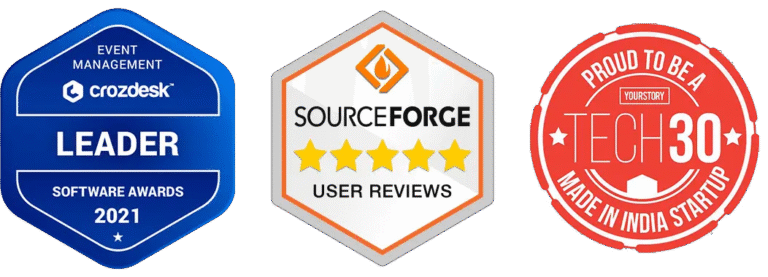
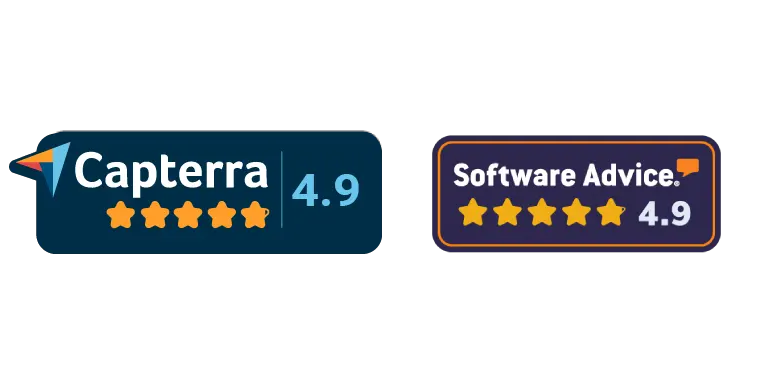
© 2026 — Samaaro. All Rights Reserved.